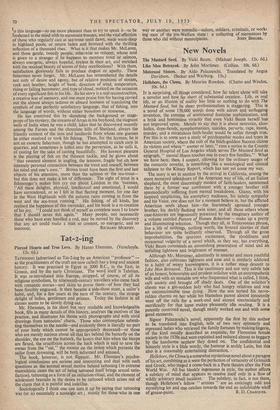New Novels
IT is surprising, all things considered, how far talent alone will take a novelist and how far short of substantial creation. Life, or real life, or an illusion of reality has little or nothing to do with The Mustard Seed, but its sheer professionalism is staggering. This is a novel of some 150,000 words done with adroit and unflagging invention, the extreme of sentimental feminine sophistication, -and a brisk and bottomless vivacity that even Vicki Baum herself has not improved upon. Merely to say that it is about neurotics, alco- holics, dope-fiends, nymphomaniacs, suicides, perverts, rape, incest, murder, and a miraculous faith-heater would be unfair though true. For this is in some sort a study of psychopathic modes and types in American society, where the cult of the bitch-goddess Success claims its victims and where " sooner or later," runs a notice in the County General Hospital of Los Angeles which serves The Mustard Seed as epigraph, " mental illness touches one in every five families." What we have here, then, I suspect, allowing for the ordinary usages of the romantic novelist, is something like a sociological and clinical tailpiece to the Kinsey Report, which has not yet come my way.
The story is set in motion by the arrival in California, among the more moneyed splendours of the American way of life, of an Italian shepherd, the most disarmingly modest of faith-healers, summoned there by a former war combatant with a younger brother still spasmodically suffering from mental breakdown. Giano, with his inspired simplicities, his exemplary maleness, his saintly sympathy and his Voice, one does not for a moment believe in, but the afflicted American souls about him—the fearsomely agonised younger brother, his darkly flashing twin sister, and all those others whose case-histories are ingeniously presented by the imaginary author of a volume entitled Pattern of Human Behaviour —make up a pretty and illuminating selection. Though they all, in Tennysonian phrase, live a life of nothings, nothing worth, the fevered niceties of their behaviour are quite brilliantly observed. Through all the gross improbabilities, the spurious excitement, the shoddiness and occasional vulgarity of a novel which, as they say, has everything, Vicki Baum commands an astonishing penetration of mind and an unfailing lightness and brightness of manner.
Although Mr. Mortimer, admittedly in smarter and more youthful fashion, also cultivates lightness and ease and is similarly addicted to a habit of weary knowingness, it is a rather steep descent to Like Men Betrayed. This is the cautionary and not very subtle tale of an honest, honourable and prudent solicitor with an unsympathetic wife and with an unstable son who frequented what is called, I think, café society and brought off shady deals. One of the solicitor's clients was a gin-sodden lady who had hungry relatives and was an unconscionable time dying. How the son turned his nerve- ridden charms on her while his blameless parent almost innocently went off the rails for a week-end and atoned spectacularly and sacrificially for that lapse makes pleasantly idle reading. It is a patently contrived novel, though neatly worked out and with some good moments.
Signor Palazzeschi's novel, apparently the first by this author to be translated into English, tells of two very spinsterly and repressed ladies who retrieved the family fortunes by making lingerie, of the kind usually described as exquisite, for Florentine female society in the 1920s and were exploited and reduced almost to beggary by the handsome nephew they doted on. The confidential and leisurely style is a little wordy, the humour is archly Latin, but this also is a reasonably entertaining distraction. •
Hellebore, the Clown is a somewhat mysterious novel about a paragon of his art, combining as it were the perfection of virtuosity of Grimaldi and Grock, who staged a come-back in a Paris theatre after the First World War. All but bleakly ingenuous in style, the author affects a subtlety of mind that appears to resolve itself only in a flow of wildly arbitrary small incident. The subtlety, in fact, is not there, though Hellebore's fellow " artistes " are an enticingly odd and mystifying lot and one catches towards the end an indubitable whiff


































 Previous page
Previous page